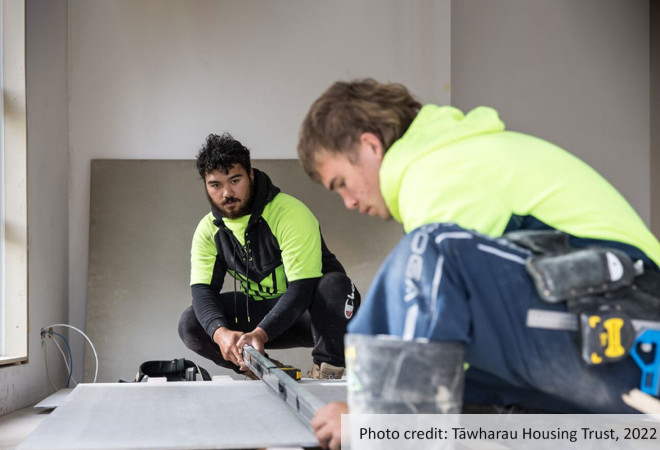
Beyond tuakana teina | Exploring Māori vocational pathways
Status
Completed: 18 September 2024
Project Details
A collaborative, action research project that investigated how a tuākana-tēina model of trade training can provide better learning outcomes and greater success for Māori learners in the construction industry.
Aims
The research aimed to answer two key questions:
- Will a tuākana-tēina model of trade training provide better learning outcomes and greater success in the construction industry for Māori compared to existing Western apprenticeship models?
- What are the different tuākana-tēina scenarios applicable to this training model?
Methodology
The research used a case study of Tāwharau Housing Trust and their approach toward Māori trade training and apprenticeships in construction, to explore and identify what works for Māori learners.
Tāwharau Housing Trust is a small whānau-based construction company operating out of Rotorua, focusing on applying Māori approaches and values to develop the next generation of Māori builders and tradespeople for the construction industry.
This study used data collected from focus group interviews with Tāwharau Housing Trust personnel and employees. Due to the high-pressure timeframes and workload within the construction industry, conducting focus groups interviews was the most efficient method of data collection across the highest number of participants in the time that was available.
This project is informed by kaupapa Māori research methodology.
A survey of the available literature as it pertains to Māori trade training and apprenticeships also forms part of this research.
Team

Dr Joshua Kalan
Researcher / Co-Project Lead
Te Whare Wananga o Awanuiārangi
Jayden Thompson
Co-Project Lead
Director, Tāwharau Housing Trust
Dr Mei Winitana
Co-Project Lead / Research Coach
Ako AotearoaStatus
Funding
$64,400.00 (excl GST)
Key Findings
What began as a straightforward exploration, soon morphed into a deeper approach beyond tuakana teina, and into the rediscovery of the depth and riches of an established indigenous tradition of vocational training dating back to customary times.
This study reveals the deeper cultural context about tuakana teina; that precolonial Māori society already had established traditions, models and frameworks of vocational training. It argues that cultural artefacts, like tuakana teina, are best approached and appraised within their specific cultural context. For example, how tuakana teina is primarily a relationship and a natural consequence of a supportive and nurturing environment. As such, it should be appraised within its wider context of whānau and whakapapa.
The course of this research prompted the emergence of a Te Ao Māori vocational training framework, based on the successful innovations of the past, like ancient Whare Wananga and the Māori Trade Training Scheme of the 1960-70s. This includes incorporating the relational values and practices like whakapapa, whanaungatanga, manaakitanga, and tikanga, with practices that guide the vocational training like Te Whare Tapa Whā, Tuakana-teina, and other ako-type actions.
Successful practices for effective implementation of tuakana teina within a vocational training context
- Develop a ‘Whare Tapa Wha’ training model that addresses the four dimensions of support for their apprentices: cultural foundations, pastoral care, trade theory and practical skills.
- Acknowledge the importance of Māori learners to stay connected to their cultural identity, as a resilience factor in the modern world.
- Encourage close-knit learner groups, forming strong ties through the dynamics of tikanga and whanaungatanga.
- Develop pastoral care practices that are meaningful, realistic, are respectful, and that are responsive to the individual needs of the apprentices.
- Experiment and trial ways of engaging tuakana teina relationships that are peer- to-peer, or year group to year group learning.
- Implement incremental learning pathways derived from the ancient whare wānanga, melded with current forms of apprenticeship training.
- Be prepared to trial small learner groups in various training programmes or processes that are thought through clearly, and preferably in collaboration with the apprentices.
- Seek a balance of user-friendly approaches to trade theory, incorporating both paper-based and e-learning resources and complementing these with ample opportunities for that apply practical skills.
- Seek ways that all staff can exercise the reciprocity of tuakana teina, and to learn alongside of the apprentices.
Key Recommendations
The research highlights four scenarios or ‘workplace essentials’ that underscore and exemplify Tāwharau’s engagement with Māori learners in the trade training space.
Workplace Essentials drawn from this study include the following:
1. Whole of Organisation Learning
2. Culturally situated learning experiences
3. Whanaungatanga
4. Te ao Māori leadership, Rangatiratanga
Takeaways for training providers and organisations
The research also offers suggested ‘takeaways’ that prospective training providers and organisations may wish to consider as an aid and support in their own efforts with supporting learners in trade training.
These insights will be of particular interest to industry training organisations who work with Māori learners and trainees with the potential for replicating aspects of Māori trade training in other vocational settings.
- A workplace family | The practice of whakawhanaungatanga literally refers to the practice and process of becoming family. To transform the conventional employer/worker relationship to the connectedness and interdependence of a workplace family will naturally prove a challenge for most workplaces. It will however be a good starting place from which to build and develop workplace culture and dynamics moving forward. Compassion and empathy are key.
- A focus on pastoral care | When team members are primarily considered part of a workplace family, pastoral care should come naturally. A workplace family looks out for each other’s needs and welfare. Prospective employers and trade training providers should recognise that not all learners come to vocational training on an equal footing and may have other competing priorities which could detract from their learning and diminish their capacity to be fully ‘present’ in the workplace.
- Cultural support and cultural capability for staff | Workplaces and learners alike could potentially benefit from being sensitive to the cultural needs of learners, regardless of their ethnicity and culture. Cultural sensitivity and support can be as ‘simple’ yet powerful as learning to pronounce someone’s name correctly, being sensitive to their cultural or religious dietary requirements, or just acknowledging and respecting their cultural identity.
- Incremental stages of learning | Tāwharau Housing Trust demonstrated the simplicity and effectiveness of incremental learning steps with their Poutama model. For many learners the journey or climb seems too long or the rungs are placed too far apart. Far easier to use a ‘scaffold’ or better still, an ‘elevator’, that comes down to the learner’s level and takes them stage by stage to where they need to go.
- Hands-on learning | vocational training strategies should reflect the needs of learners through a hands-on and practical approach that supports and enlivens the more theoretical and conceptual aspects of the training curriculum. Theory content can often be more readily grasped by learners if it is supported with practical hands-on lessons and application.
- Group learning versus individual learning | Tāwharau Housing Trust has demonstrated the effectiveness of group- learning approaches with their trainees and apprentices. The strength of customary Māori society was the collective, based in whānau, hapū and iwi – to the extent that one’s identity and survival was inextricably linked to one’s whakapapa and kinship group.
This report identifies successful practices for effective implementation of tuakana teina within a vocational training context. It offers suggested ‘takeaways’ that prospective training providers and organisations may wish to consider as an aid and support in their own efforts with supporting Māori learners in trade training.
- 18 September 2024
There are five Value pathways; designed to increase cultural awareness of Māori knowledge, values and indigenous teaching methodologies.
A YouTube video explaining the concept of Tuakana-Teina.
(YouTube, 2.44 mins, 240p).
- 30 October 2012
You can improve the learning outcomes of Māori learners in your workplace. Check out the recommendations in an Ako Aotearoa research report.